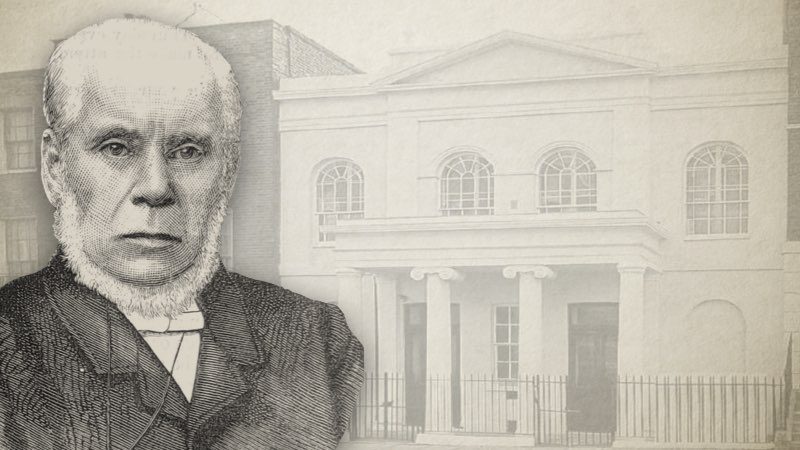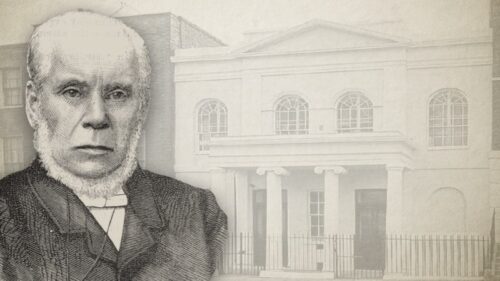William Styles
William Styles (1842-1914) was a Strict and Particular Baptist preacher. He served as pastor for the churches meeting at High Wycomb (2 years); Lower Holloway (3 years); Providence, Islington; Keppel Street (10 years); West Ham (4 years); West Hill, Wandsworth (6 years). After his conversion to Christ while sitting under the ministry of the Congregationalists, he was baptized by C. H. Spurgeon and became a member of the Metropolitan Tabernacle. During this time, he enrolled in the Pastors’ School. He eventually embraced high views of sovereign grace and strict communion principles, thereby leading him to join the Strict and Particular Baptist denomination. He was an outspoken opponent of the pernicious teachings of duty-faith and the free-offer, believing that no church, minister or member had a right to identify as “Strict and Particular Baptists” if holding to those errors. He took a leading role in the Metropolitan Association of Strict Baptist Churches and was a supporter of the Strict Baptist Mission. Both of these organizations now embrace the errors of duty-faith and the free-offer, standing opposed to the faith and order of the Strict and Particular Baptists.
William Styles, A Guide To Church Fellowship (Complete)
William Styles, A Memoir of John Hazelton (Complete)
-
A Biography of John Hazelton, by William Styles (Complete), William Styles, A Memoir Of John Hazelton (Complete)
Chapter 7
"'Tis not a cause of small import The Pastor's care demands."—Doddridge. "Preaching administ'ring in every work Of his sublime vocation, in the walks Of worldly intercourse 'twixt man, and man, And in his humble dwelling, he appears A labourer with moral virtue girt, With spiritual graces like a glory crowned." Wordsworth's “Excursion." The settlement of a pastor over a Church is an important event in the history of religion. It is intimately connected with the glory of God, and the welfare of souls, and is to the individual himself, and to the people of his charge, the commencement of an era of prosperity and success, or an epoch of declension and decay. In the choice of John Hazelton his people discovered a wise sense of…
-
A Biography of John Hazelton, by William Styles (Complete), William Styles, A Memoir Of John Hazelton (Complete)
Chapter 8
"Let thine eyes look right on, and let thine eyelids look straight before thee."—Proverbs 4:28 "There stands the messenger of truth! there stands The legate of the skies! His theme divine, His office sacred, his credentials clear. By him the violated law speaks out Its thunders; and by him, in strains as sweet As angels use, the gospel whispers peace."—Cowper Chadwell-Street is in the heart of a densely populated district in the north of London, and was in 1858 one of the most advantageous positions for a dissenting chapel that could have been found in the whole of the metropolis. Many changes have occurred in recent years. Old Smithfield, which was then an institution, has disappeared. Clerkenwell was the home of numbers of prosperous watch-makers…
-
A Biography of John Hazelton, by William Styles (Complete), William Styles, A Memoir Of John Hazelton (Complete)
Chapter 9
"We can do nothing against the truth but for the truth."—2 Corinthians 13:6 "Should all the forms that men devise Assault my faith with treach’rous art, I'd call them vanity and lies, And bind the Gospel to my heart." Attention is at this point claimed to a brief and cursory review of some of the more public religious events which transpired during the period to which this and the preceding chapter are devoted. An accurate estimate of the character of a prominent Christian minister is impossible, unless we take into account the spiritual tendencies of his age, the currents of popular thought, the opinions which were then rising into favour or falling into disrepute, and the attitude and conduct of those by whom the professing…
-
A Biography of John Hazelton, by William Styles (Complete), William Styles, A Memoir Of John Hazelton (Complete)
Chapter 10
The Student—A Retrospect "Give me a Bible in my hand, A heart to read and understand, This sure unerring Word. I'd urge no company to stay, But sit alone from day to day In converse with my Lord.” —Susannah Harrison, altered by David Denham. “A SELF-MADE MAN." Popular as is this phrase, we regard it with great disfavour, judging it to obscure His prerogative who governs all events in heaven and earth according to His sovereign pleasure, and to claim for a creature a power with which his all-wise Creator has not been pleased to invest him, "There's a divinity that shapes our ends, rough hew them how we will." "A man's heart deviseth his way, but the Lord directeth his steps." "There are many…
-
A Biography of John Hazelton, by William Styles (Complete), William Styles, A Memoir Of John Hazelton (Complete)
Chapter 11
"Patient continuance in well-doing.”—Romans 2:7 The inevitable result of the Norwich Chapel case, was to widen the already existing breach between the Strict and Particular Baptists, and the rest of their denomination. By the latter the issue of the celebrated suit was almost universally regarded as a victory of charity and candour over narrowness and bigotry. Nearly all the public references to the men who had dared the desperate venture expressed the utmost exultation that they had been worsted in the unequal fight. Few appeared to regard their self-denying heroism with any other sentiment than pitying contempt. Men who had secretly desired to introduce a similar innovation in other quarters, but had hitherto lacked the courage of their convictions, now began to wax bolder; and…
-
A Biography of John Hazelton, by William Styles (Complete), William Styles, A Memoir Of John Hazelton (Complete)
Chapter 12
"His character was marked by great caution and wisdom. Some deemed him too hesitating and slow. Still they generally found that at last he was right, and that the steps he had taken were safe. He was a prudent, and admitting our individual and characteristic infirmities, a truly wise man. He never involved himself in difficulty, or plunged into danger through his imprudence. He always thought much before he decided, and when he moved he felt that his ground was firm. He was cautious in abstaining from everything violent. He was no mere party-man; he never committed himself by any political demonstration, and studiously avoided the arena of warm and angry debate, of violent, of clamorous controversy, He strictly confined himself to his duties as…


